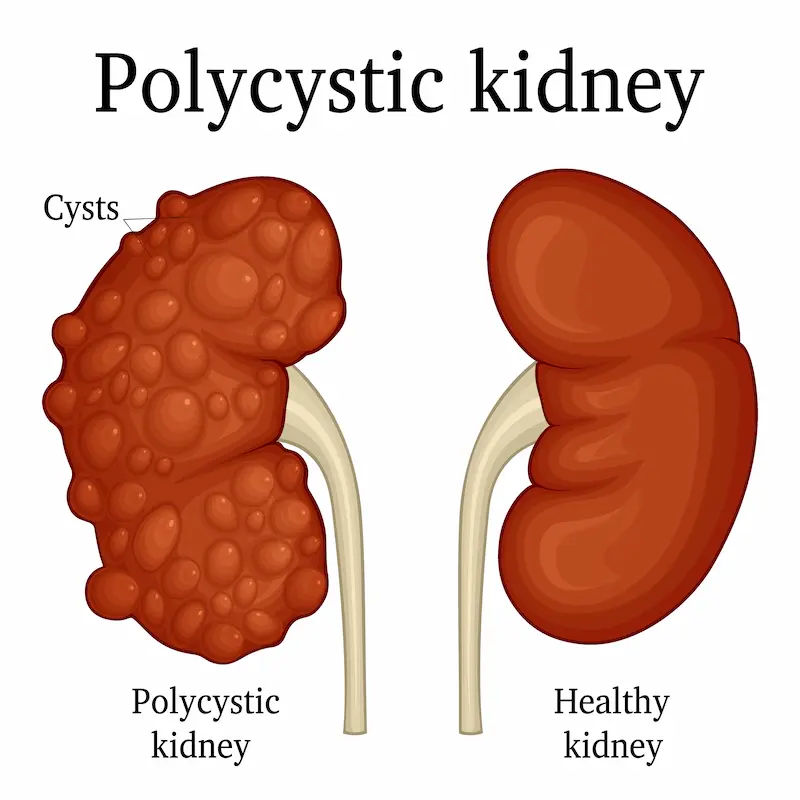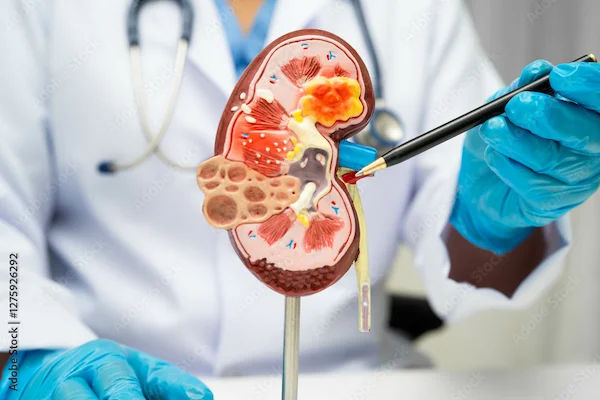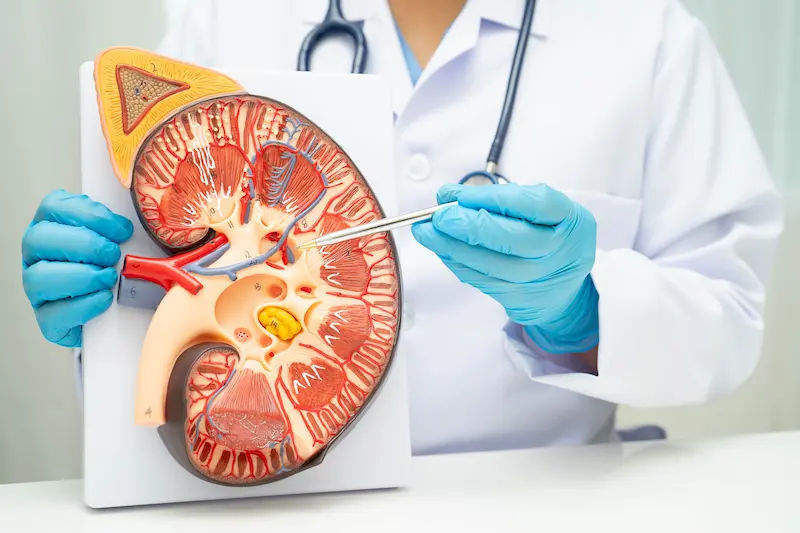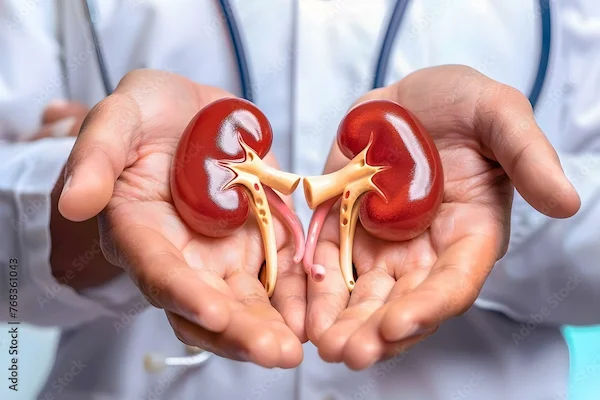Guide to Kidney Transplantation Insights
Get essential insights into kidney transplantation, including the procedure, recovery process, and what to expect before and after the transplant.

Written by Dr. Dhankecha Mayank Dineshbhai
Reviewed by Dr. Vasanthasree Nair MBBS
Last updated on 13th Jan, 2026

Introduction
Facing kidney failure can feel overwhelming, but a kidney transplant often represents a beacon of hope, a chance to regain freedom and a better quality of life. This procedure, where a healthy kidney from a donor is placed into your body, is more than just surgery; it's a life-changing journey. However, the path from diagnosis to a thriving life post-transplant is filled with complex decisions and important adjustments. This guide goes beyond the basic facts to offer genuine insights into kidney transplantation. We will walk you through the entire process, from determining if you're a candidate to the realities of long-term management. Our goal is to empower you with knowledge, helping you understand what to expect, the challenges you might face, and the profound benefits that can make this journey worthwhile. Whether you are a patient, a potential living donor, or a supportive loved one, these key insights will prepare you for the road ahead.
Understanding Kidney Failure: The Why Behind a Transplant
When your kidneys lose their ability to filter waste and excess fluids from your blood effectively, you develop end-stage renal disease (ESRD). At this point, the body cannot sustain itself without artificial support. Understanding the "why" is the first step in appreciating the "what" of a transplant.
Common Causes of End-Stage Renal Disease (ESRD)
The most common culprits leading to kidney failure are diabetes and high blood pressure, which slowly damage the kidneys' delicate filtering units over many years. Other causes include polycystic kidney disease (an inherited condition), glomerulonephritis (inflammation of the kidney's filters), and prolonged urinary tract blockages. Knowing the underlying cause is crucial for your transplant team, as it can influence treatment plans and future health strategies to protect your new kidney.
Treatment Options: Transplant vs. Dialysis
Once kidneys fail, the two main treatment options are dialysis and transplantation. Dialysis is a life-sustaining treatment that mechanically filters your blood, but it requires a significant time commitment (several hours, multiple times a week) and often comes with dietary restrictions and fatigue. A kidney transplant, while a major surgery, aims to be a more permanent solution. It can free you from the routine of dialysis, allow for a more liberal diet, and significantly improve both life expectancy and quality of life. However, it's not a cure; it's an exchange of one set of challenges (dialysis) for another (managing a transplant). Discussing the pros and cons of transplant versus dialysis with a nephrologist is a critical first step. If you're navigating this decision, consulting a specialist online with Apollo24|7 can provide initial clarity and guidance.
Consult a Nephrologist for the best advice
Are You a Candidate? The Kidney Transplant Evaluation Process
Not everyone with kidney failure is automatically eligible for a transplant. The evaluation process is thorough, designed not just to see if you need a new kidney, but if your body can handle the procedure and the lifelong care that follows.
Medical and Psychological Assessments
The comprehensive evaluation involves a series of tests, including blood tests to check for infections and tissue typing, imaging scans (like a CT scan) to assess the health of your blood vessels and bladder, and heart and lung tests to ensure you can survive major surgery. Crucially, the team will also screen for cancers or active infections that could be worsened by immunosuppressant drugs. A psychological or social worker evaluation is equally important. The team needs to know that you understand the commitment, have a strong support system, and are likely to adhere to the strict medication regimen post-transplant.
The Importance of a Strong Support System
This point cannot be overstated. The transplant journey is demanding. A strong support system of family or friends is vital for practical help (like transportation to appointments) and emotional encouragement. Your commitment and your support network's strength are key factors the team considers during the kidney transplant evaluation process.
Get Your Health Assessed
The Journey of a Donor Kidney: Living vs. Deceased Donation
Where does the new kidney come from? There are two primary sources, each with its own journey and implications.
The Living Donor Advantage
A living donor transplant involves receiving a kidney from a healthy living person, often a family member, friend, or sometimes even an altruistic stranger. This option has significant advantages. The surgery can be scheduled at an optimal time, avoiding the long wait. Kidneys from living donors also tend to function immediately and last longer. For the donor, modern surgical techniques (often laparoscopic) make recovery quicker and less painful than in the past. Extensive testing ensures the donor is healthy enough to live a normal life with one kidney.
Navigating the Deceased Donor Waitlist
If a living donor isn't available, you'll be placed on a national deceased donor waitlist. The wait can be years long. Your position on the list is determined by a complex scoring system that considers factors like blood and tissue type match, time spent on dialysis, age, and how difficult you are to match. The waiting period requires patience and diligent self-care to stay healthy enough for when "the call" comes. Understanding the kidney transplant waitlist process can help manage expectations during this challenging time.
The Transplant Surgery: A Step-by-Step Overview
The transplant surgery itself typically takes three to six hours. Contrary to what many think, your own failing kidneys are usually left in place unless they are causing problems like infection or high blood pressure. The new kidney is placed in your lower abdomen, connecting its artery and vein to your iliac blood vessels and its ureter (the tube that carries urine) to your bladder. This location makes it easier to surgically access and monitor the new organ. After surgery, you'll spend a few days in the hospital, closely monitored for initial function and any signs of complications.
Life After Transplant: The New Normal
The surgery is just the beginning. The real work starts with lifelong management to protect your precious gift.
The Critical Role of Immunosuppressant Medications
To prevent your immune system from attacking the new kidney (rejection), you will need to take immunosuppressant drugs every day for the rest of your life. Adherence to this medication schedule is non-negotiable. These drugs come with side effects, such as increased susceptibility to infections, weight gain, and a higher risk of certain illnesses, which your team will help you manage. Regular blood tests, which can be conveniently done via home collection services by Apollo24|7, are essential to monitor drug levels and kidney function.
Monitoring for Signs of Organ Rejection
Vigilance is key. You must be aware of the symptoms of kidney transplant rejection, which can include flu-like symptoms, decreased urine output, swelling, tenderness over the transplant site, or a rise in creatinine levels (a key indicator of kidney function). Any such signs warrant immediate contact with your transplant team.
Diet, Exercise, and Long-Term Health
Post-transplant, you'll work with a dietitian to create a heart-healthy plan, as immunosuppressants can increase the risk
of diabetes and high cholesterol. Regular exercise is encouraged to maintain a healthy weight and boost overall well-being. This new normal is about balance: celebrating your renewed health while being disciplined about your care.
Weighing the Pros and Cons: Risks and Benefits of a Kidney Transplant
It's crucial to have a balanced view.
- Benefits: Freedom from dialysis, improved energy, fewer dietary restrictions, better quality of life, and longer life expectancy.
- Risks: Risks of the surgery itself (infection, bleeding), side effects of immunosuppressants, and the potential for rejection. The decision is deeply personal and should be made with a full understanding of both sides.
Conclusion
The journey through kidney transplantation is one of immense challenge and profound reward. It demands courage, resilience, and a lifelong partnership with your healthcare team. The insights into kidney transplantation shared here, from the detailed evaluation to the realities of life after surgery, aim to demystify the process and empower you as an active participant in your health. While the path is not easy, the potential payoff of a life free from dialysis, filled with more energy and opportunity is why thousands of people choose this path each year. If you or a loved one is considering this option, arm yourself with knowledge, build a strong support network, and maintain open communication with your doctors. This guide is a starting point; your medical team will provide the personalised roadmap for your unique journey. If you have specific concerns about your eligibility or post-transplant care, booking a consultation with a nephrologist through Apollo24|7 is a proactive next step.
Consult a Nephrologist for the best advice
Consult a Nephrologist for the best advice
Dr Ch Sashidhar
Nephrologist
20 Years • MBBS, MD General Medicine, DNB, Nephrology
Secunderabad
Apollo Hospitals Secunderabad, Secunderabad

Dr Praveen Kumar Etta
Nephrologist
10 Years • MBBS,MD DM(SGPGI) FORMER ASST(PIMS)
Hyderabad
Apollo Spectra Ameerpet, Hyderabad

Dr. Pardha Saradhi
Nephrologist
9 Years • MBBS, MD-DNB (Gen. Med.), DNB (Nephro)
Hyderabad
Apollo Hospitals D R D O kanchanbagh, Hyderabad
(75+ Patients)

Dr. Manju Kamal
Nephrologist
12 Years • MBBS,MD(General Medicine), DNB,DM(Nephrology)
Angamaly
Apollo Hospitals Karukutty, Angamaly

Dr. Aswini Kumar Panigrahi
Nephrologist
23 Years • MBBS, MD (Int. Med.), DNB Nephro
Hyderabad
Apollo Hospitals Jubilee Hills, Hyderabad
(225+ Patients)
Consult a Nephrologist for the best advice
Dr Ch Sashidhar
Nephrologist
20 Years • MBBS, MD General Medicine, DNB, Nephrology
Secunderabad
Apollo Hospitals Secunderabad, Secunderabad

Dr Praveen Kumar Etta
Nephrologist
10 Years • MBBS,MD DM(SGPGI) FORMER ASST(PIMS)
Hyderabad
Apollo Spectra Ameerpet, Hyderabad

Dr. Pardha Saradhi
Nephrologist
9 Years • MBBS, MD-DNB (Gen. Med.), DNB (Nephro)
Hyderabad
Apollo Hospitals D R D O kanchanbagh, Hyderabad
(75+ Patients)

Dr. Manju Kamal
Nephrologist
12 Years • MBBS,MD(General Medicine), DNB,DM(Nephrology)
Angamaly
Apollo Hospitals Karukutty, Angamaly

Dr. Aswini Kumar Panigrahi
Nephrologist
23 Years • MBBS, MD (Int. Med.), DNB Nephro
Hyderabad
Apollo Hospitals Jubilee Hills, Hyderabad
(225+ Patients)
More articles from Kidney Disease
Frequently Asked Questions
1. What is the life expectancy after a kidney transplant?
Life expectancy varies based on age, overall health, and whether the kidney came from a living or deceased donor. On average, a kidney from a living donor lasts 15-20 years, while one from a deceased donor lasts 10-15 years. Many recipients live full, active lives for decades after their transplant.
2. What are the early signs of kidney transplant rejection?
Early signs can be subtle and may include fever, tenderness or pain over the graft site, fluid retention (swelling), a significant decrease in urine output, and a sudden rise in blood pressure. Regular blood tests are the primary way to detect rejection before symptoms appear.
3. Can a person live a normal life after a kidney transplant?
Yes, most people can return to a very active and 'normal' life. This includes returning to work, traveling, and exercising. The main differences are the need to take daily medications and attend regular follow-up appointments.
4. What are the financial costs associated with a kidney transplant?
The cost is significant, including pre-transplant evaluation, the surgery itself, hospital stay, and lifelong immunosuppressant medications. However, in many countries, including India, insurance schemes and government programs often cover a substantial portion of these costs. It's essential to discuss financial counseling with your transplant center.
5. How long is the recovery time after transplant surgery?
Hospital stays are typically 3-7 days. Most people can return to non-strenuous activities within 6-8 weeks. Full recovery takes about 3-6 months, but it's important to follow your team's specific guidelines regarding lifting restrictions and returning to work.





